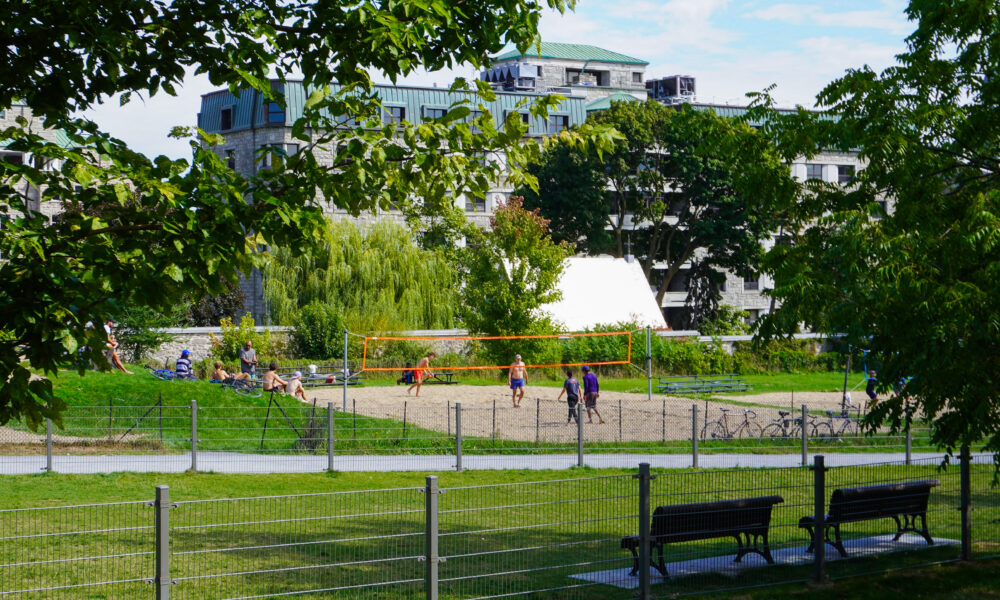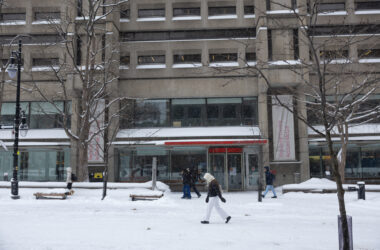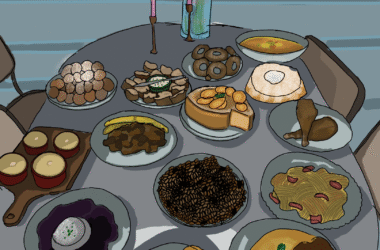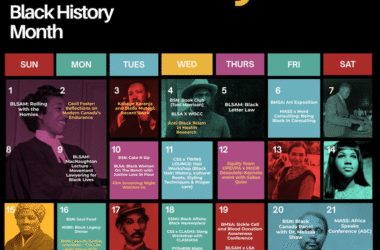They walk among us, disguised as men. They whisper in accents you don’t recognize and laugh at jokes no one finds funny. Rumour has it that McGill students have superior, bigger ears for listening, while Concordia students have pointier elbows indicative of too much time spent doing studio art.
McGill x Concordia is the only truly convincing love story of our generation—enemies turned lovers of Montreal’s dark-academia sphere. Both are anglophone, both victims of tuition hikes. As two schools with highly international student populations, they are the highly unlikely downtown darlings of the Montreal imagination.
Welcome to Concordia 101—The Tribune’s crash course for McGill students looking to co-opt the best Concordia has to offer!
Studying Surrounded by the Enemy
You would need an extra pair of hands to count the number of times a Concordia student has complained about a McGillian using their libraries. Open to the public everyday from 7:00 a.m.-11:00 p.m., both the Webster and Vanier Libraries have quickly become popular spaces for McGill students looking to study. What many people don’t know is that Concordia’s online event calendar lists many drop-in offerings that don’t require a Concordia ID to register; nearly once a month, the Vanier Library on Loyola hosts Therapy Dog drop-in at VL-101 from 11:30 a.m.-1:30 p.m. and VR gaming on the third floor. The Webster Library on the Sir George Williams Campus hosts the Fibre Arts Technology Club every Tuesday afternoon from 2:00 p.m.-4:45 p.m. at the Technology Sandbox room, for those interested in knitting, crocheting and “integrated work with wearable technology.”
Though currently closed, the Concordia Greenhouse in the Henry F. Hall rooftop is another study space option that brings a touch of greenery even in winter, with a grand reopening anticipated by the end of Winter 2025.
Creativity without a Prerequisite
Looking for a space to get creative? At two permanent Concordia Art Hive studios, a pair of creative art therapists host four weekly free walk-in non-directed art sessions. Alongside these time-slots, they offer approximately ten pop-up events per term at varying spaces on Concordia campus to facilitate community bonding.
For those who would rather admire than create art, the Leonard and Bina Ellen Art Gallery offers free contemporary exhibitions, while the Concordia Film Festival hosted by the Mel Hoppenheim School of Cinema is the longest running student film festival in North America, also free to attend.
You Aren’t What You Eat
If you’re looking for a quick meal, the People’s Potato Kitchen is a vegan soup kitchen at Hall building H-700 that offers donation meals from Monday to Thursday from 12:30 p.m.-2:00 p.m., as well as a food bank every second Friday. On the Loyola Campus, the Hive Cafe Co-op has a similar free vegan meal offering on Fridays from 12:30 p.m.-1:30 p.m. on the SC building’s second floor.
Though initiated in 2015 by two McGill psychology students, Vent over Tea has since become a Concordia-run service, offering one-hour anonymous, non-judgemental listening sessions with trained volunteers at a cafe of your choice. The service is free—you just need to cover the cost of your own drink. Whether you prefer to meet downtown, in the West Island, or online, Vent over Tea offers a safe space to feel heard and serves as an example of the meaningful collaboration that can emerge when McGill and Concordia are able to realize their responsibilities to a shared Montreal community.
A school by any other name would smell as sweet. Beneath the banners and rivalries which obscure what unites us, we are all struggling students trying to navigate the unfamiliar, hostile environment of being young dreamers. Though there is comfort in school pride, there is shame in personal apathy. University is an opportunity to discover yourself, and that journey begins with fostering an understanding of the shared challenges that every student faces. One person’s success is never another’s failure. To share resources, spaces, and support is more than an act of generosity; it is an act of student solidarity—a respectful acknowledgement of our mutual struggle which spares no one. It’s time that we ask not what we can do for our schools, but what our schools can do for us.









